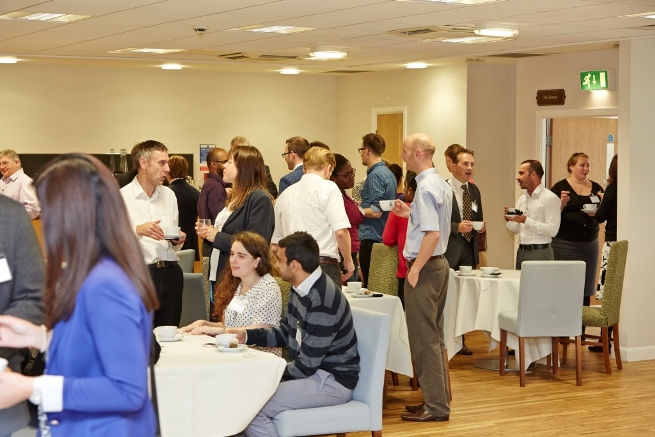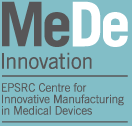Past, present and future of bedside manufacturing processes – October event outcomes

November 20, 2014
MeDe Innovation Research Workshop,
30 October 2014
On Thursday 30th October, Newcastle University hosted the second MeDe Innovation Outreach workshop to consider in-clinic manufacture and the minimally invasive implantation of materials.
Here at MeDe Innovation, we’re trying to solve problems involving damage to the cartilage and underlying bones in the hip, knee and other joints. If more of these defects can be treated earlier and in a minimally invasive way, then the patient’s rehabilitation – and the cost to the healthcare system – can be minimised.
Clinical, regulatory, industrial presentations covered elements of the past, present and future of bedside manufacturing processes and approaches, before a series of presentations outlined the research being undertaken in this area as part of the MeDe Innovation Centre.The workshop began with three clinical presentations. Martyn Snow from the Royal Orthopaedic Hospital gave an overview of the range of procedures which can be performed minimally invasively using an arthroscope. Kenny Rankin from Newcastle University gave an overview of cementoplasty techniques which can be used to deliver materials for bone replacement or augmentation, and Andy Stafford from The Cosmetic Dental Clinic gave a presentation on the current state of the art in dental dental CAD/CAM techniques, which allow dental restorations to be made in-clinic, based on patient imaging, enabling single visit treatments for patients.
John Wilkinson from the MHRA then outlined how the regulatory system supports innovation through providing a clear route to market, before a series of talks focussing on new products and industrial developments. Robin Quirk from Locate Therapeutics described the TAOS range of drug eluting injectable materials for bone repair, and Clayton Wilson from CellCoTec outlined their INSTRUCT process for cartilage repair in the knee, which combines autologous cells with a structural scaffold in a single surgical intervention. Ian Flatters from JRI Orthopaedics described an Innovate UK project being jointly undertaken by JRI and Surgical Innovations which was examining the potential for extending arthroscopic interventions to the hip for the delivery of products for bone and cartilage repair. Daniel Daryaie of Materialise described how their “engineering on anatomy” CAD/CAM approach had been used in a range of musculoskeletal applications, encompassing personalised implants and surgical guides, and image based surgical planning.
Kenny Dalgarno, Javier Munguia, Matt Benning and Natacha Rodrigues from Newcastle University then outlined the research being undertaken at Newcastle University on cell/material co-processing, the in clinic manufacture of hybrid composite structures, and on the arthroscopic delivery of structural materials, before Nicholas Dunne from Queens University Belfast (QUB) and Deepak Kalaskar from UCL described two projects which had been supported by the MeDe Innovation “Fresh Ideas Fund”. Work at QUB on thermo-sensitive medical devices for bone regeneration, and at UCL on 3D printing of lumbar fusion cages has just started and will be completed over the next six months.
Key messages from the day were:
- Single surgery solutions are attractive to patients and healthcare providers, and where these could be combined with minimally invasive delivery this could minimise rehabilitation periods.
- There are established products and procedures for in-clinic manufacture of personalised products, and that developments in scanning techniques, software and materials processing meant that there were opportunities for this to expand.
MeDe Innovation will continue to research new products and processes which will help healthcare providers to do more for less, using in-clinic manufacture and the minimally invasive implantation of materials to support early, effective treatment of musculoskeletal conditions.
For updates on the research, invitations to events and news from MeDe Innovation, join us: https://mede-innovation.ac.uk//join-us/
